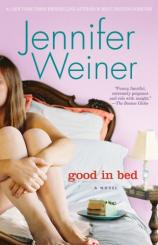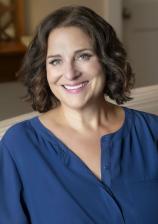Interview: June 21, 2002
June 21, 2002
Jennifer Weiner has a refreshing sense of humor and a firm grasp on life's priorities that is reflected in her novel, GOOD IN BED, which is now available in paperback. In this interview with Bookreporter.com's Roberta O'Hara, she reveals her determination to portray the truth about the joys and heartaches of a plus size woman.
BRC: Cannie is a deliciously true portrayal of a real woman facing the odds every plus size woman faces. I thought it was brave of you to write about a large girl. Why her? Why her instead of a size 6 girl who has lost her boyfriend, or been abandoned by her father?
JW: Because all the books in the world are about size six girls -- or size ten girls who mistakenly believe they are enormous. I am a devoted consumer of "women's fiction" -- Helen Fielding, Melissa Bank, Laura Zigman, Susan Isaacs, Jennifer Crusie, Olivia Goldsmith, and everyone in between. I've been an avid reader all my life. And in very few places did I ever come across a heroine who looked like me -- that is, a plus-size woman who wound up with a happy ending that didn't involve radical weight loss. I wanted to tell a Cinderella story where Cinderella gets her happy ending without dropping down to a size six because a book like that, first and foremost, would fill a gap in my own heart and my own library, and could maybe be some measure of comfort to other teenage girls who devour "chick books" and come away feeling like they're the only ones who've ever weighed more than their boyfriends, struggled to find a prom dress, had a grandmother who religiously relocated the bread basket at every meal out, etc.. In addition, plus-size women have their own issues, their own concerns, their own places, that I'd never really seen explored from the "fat girl's perspective." There are millions of women who've been through Weight Watchers lectures, but I've rarely seen them written about with the kind of humor and poignance and flat-out familiarity that millions of women have with them (and, judging from the enthusiastic response the "fat class" portions of GOOD IN BED have received, not many readers have, either!"
BRC: I found Cannie's mother to be a funny character. How did she develop? Is she based on anyone in your own life?
JW: Heh. Um....well, okay, here's the truth. Cannie's Mom has a lot in common with my Mom. They both have lots of activity --- specific kinds of sneakers, and similar senses of humor and the world, and they both fell in love with women in their fifties. Showing my mother a draft of GOOD IN BED was really scary. I gave her this little speech, where I said that I'd written this book, and there was a character in it kind of like her, but I didn't want her to be hurt or offended by it. I told her to read it and tell me about anything she had problems with, and I'd change it or delete it -- whatever made her comfortable. "But please," I begged, "please don't make me take out the gay stuff. It's wicked funny!" And she wound up being very cool about it. Thank goodness.
BRC: Divorce is a subject we are all familiar with. I thought you had great insight into the affects Cannie's father's abandonment had on her and her siblings. Where did that insight come from? Has your own life been touched by divorce?
JW: Well, like Cannie, my father said "sayonara" when I was a teenager. And I've thought a lot about divorce and its consequences as I grew up. I think divorce makes you question a lot of things. There's the whole "What did I do wrong?" thing, which I think everyone whose parent leaves goes through, no matter how frequently or strenuously the parents insist it wasn't his or her fault. And then there's the thing that becomes central to Cannie's character -- not trusting love, and spending your twenties trying to unravel its mysteries. I think that questioning nature was part of what made Cannie such an identifiable heroine. She's someone who goes through life asking "why" about a lot of things.
BRC: Did you find yourself thinking about Bridget Jones when you were writing, or thinking about the inevitable comparisons that would come if Cannie ever made it to print?
JW: I honestly didn't think about Bridget much while I was writing, because I wrote GOOD IN BED in my bedroom. I didn't workshop it, I didn't share it with friends, I didn't have an editor or an agent, and I wasn't even sure the book would ever see the light of day. So I was able to put all of the potential comparisons aside and tell the story I wanted to tell. I was able to write very freely, without thinking of how the book would fit in with other books on similar subjects. That came later, after I had the agent, and the editor, and started to worry. "Oh, God, they're going to say that it's Bridget Jones after a few months at an all-U-can-eat buffet!" I knew the comparison was inevitable, and I decided not to fight it. After all, I loved the Bridget book, and the movie, too. And I wrote the story that was in my heart. I wrote about a character I cared a lot about. If reviewers needed Bridget as a jumping-off place to discuss Cannie, that wasn't the worst thing I could imagine.
BRC: You have a wonderful, sharp sense of humor (and so does your character Cannie). Do you see yourself as being a lot like Cannie? Besides the sense of humor, how?
JW: You're too kind! Seriously, Cannie and I have a lot in common, except her life is a whole lot more interesting then mine is. Which is one of the necessities of fiction. If I'd just written a straightforward account of my own life as a plus-size journalist, I don't think I could sell a single copy. So I had to give her a more dramatic plot, so to speak, and a lot more snappy come-backs. All the funny things she says would be things I myself wouldn't think of until days later, when it was way too late.
BRC: There were some moments in the book when Cannie slipped into a rather dark place, and I was worried about her eventual outcome? Did you toy with the idea of not giving Cannie a happy ending?
JW: Nope. Not even for a minute. I decided two things as I got into writing GOOD IN BED -- the character was absolutely going to have a happy ending (because if I'm going to invest the time it takes to read 400 pages about a heroine I love, I generally insist upon a happy ending). I suppose this has to do with the character being somewhat based on me, so you could be damn sure I wasn't going to leave her broke and homeless! It would be dreadful karma.
BRC: There were also moments when she was losing a lot of weight and becoming a svelte version of herself, which is something she'd always wanted. Why did you decide to have her gain the weight back instead?
JW: Because I don't believe that thin = happy, and fat = miserable. I think those are dangerous dichotomies, especially to teens and young women who spend their lives trying to live up to a standard they can never hope to achieve, and I wanted to illustrate that in a very visceral way. When Cannie gets thin, she's at the lowest point she's ever been in her life, and when she starts to gain weight again, she's got a baby to love and a man who loves her. The point is, being a size 2, 4, 6 does not guarantee you a happy life any more than being a size 16, 18, 20 consigns you to a miserable one.
BRC: Do you think Americans are too weight/image conscious?
JW: Yes.
BRC: What is next for you? Will Cannie return?
JW: Cannie and Joy and Nifkin, of course, make a brief appearance in my next book, IN HER SHOES, which will be published in September. After that will be a book called JEZEBEL BRIGHT, another single-girl-in-the-city story with a great big twist -- our heroine is the descendent of the mythical goddess Diana. It's got elements of fantasy and film noir, and it's going to be, I hope, bigger and more ambitious (not to mention longer) then anything I've written before. After that is GOOD IN BED, the sequel, called HESITATION WALTZ. I know I said in the Q and A in the paperback version that Cannie would be a hard character to come back to, because she's happy, and happy characters don't always made for the best fiction, so I think the sequel will have lots to say about Joy.
BRC: Whom do you read? Whose writing do you most admire?
JW: I read everything -- literally. I'm an omnivore. I'll read a cereal box in a pinch. I love John Irving and Stephen King, Peter Straub and Andrew Vachss, Susan Isaacs and Jennifer Crusie, Tabitha King and Anne Tyler and Wally Lamb and Neil Gaiman and Meg Wolitzer and Anna Quindlen. I've read all of Rebecca Wells and Nicholas Christopher, Jane Green and Marian Keyes. I'm eagerly awaiting Donna Tartt's new book, and the continuation of Stephen King's Dark Tower series.




